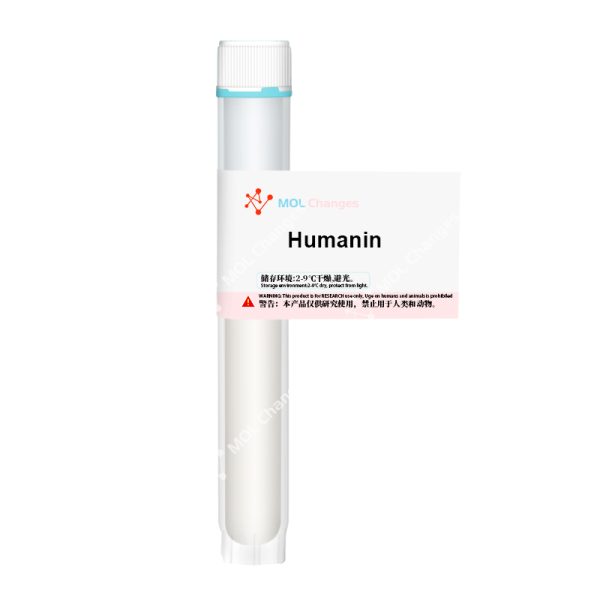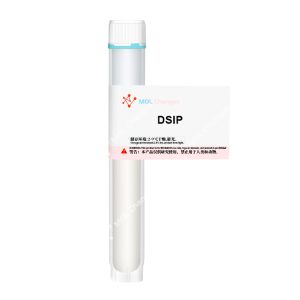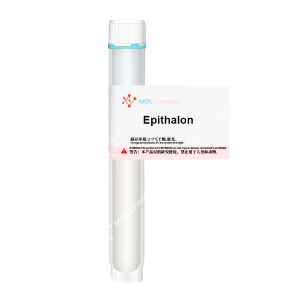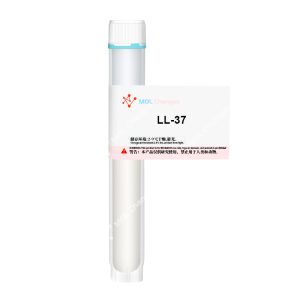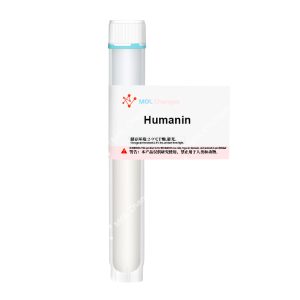Humanin is a mitochondrial-encoded peptide consisting of 24 amino acids; initially discovered within the context of Alzheimer’s disease research.
In Alzheimer’s patients, expressing Humanin within cells or adding it as an endogenous peptide protects these neurons from various Alzheimer’s-related forms of damage – significant neuroprotective effects being the primary observation made.
Humanin activates key cell survival pathways, the JAK2/STAT3/AKT being prime examples, effectively inhibiting mitochondrial-dependent apoptotic pathways; Aβ, ischemia-hypoxia, and multiple types of oxidative stress being the specific triggers mentioned.
Enhancing cellular antioxidant and to a large extent anti-inflammatory capabilities is another well documented effect.
Sequence
Met - Ala - Pro - Arg - Gly - Phe - Ser - Cys - Leu - Leu - Leu - Leu - Thr - Ser - Glu - Ile - Asp - Leu - Pro - Val - Lys - Arg - Arg - Ala
CAS Number
330936-69-1
Molecular Formula
C119H204N34O32S2
Molecular Weight
2687.27
Humanin Related Research
1.Therapeutic Potential and Clinical Applications
Significant functions in promoting glucose metabolism, improving at least some form of insulin sensitivity, and protecting blood vessels have all been shown.
Therefore an endogenous protective peptide like Humanin holds considerable potential for treating (or at least improving) age related degenerative diseases; anti-aging and more specific Alzheimer’s therapies are currently being pursued based on this line of research.
2.Metabolic and Vascular Protective Functions
Significant functions in promoting glucose metabolism, improving at least some form of insulin sensitivity, and protecting blood vessels have all been shown.
Therefore an endogenous protective peptide like Humanin holds considerable potential for treating (or at least improving) age related degenerative diseases; anti-aging and more specific Alzheimer’s therapies are currently being pursued based on this line of research.
3.Neuroprotective Effects
The direct counteraction of β-amyloid toxicity is what defines Humanin’s neuroprotective work – aggregation and subsequent deposition of Aβ are key factors in the disease’s onset.
The receptor itself activates those previously mentioned intracellular survival paths.
Signals from Humanin inhibit the aforementioned apoptosis pathways, execution proteins being suppressed; programmed neuronal death is at least partially prevented.
Beyond Aβ, degenerative neurological disorders (Parkinson’s, Huntington’s notably) show similar, if not identical, neuroprotective benefits from Humanin.
Cardiovascular protection represents a significant aspect of Humanin’s therapeutic value.
Humanin’s development as a therapeutic agent represents an important advancement in medical science.
4.Antioxidant and Anti-Apoptotic Effects
Humanin’s core, fundamental function is inhibiting normal cell apoptosis triggered by excessive stress.
Excessive oxidative stress and subsequently this form of apoptosis are among the fundamental causes of various diseases and all age-related conditions.
Humanin enhances antioxidant stress activity within tissue cells; resisting the release of mitochondrial cytochrome C being a key part of this process. This potent physiological mechanism suppresses the initiation of intrinsic apoptosis pathways, oxidative damage being the primary concern.
Notably, Humanin’s cell-stabilizing effects extend beyond just specific tissue cells – comprehensive multi-faceted protection against both excessive oxidative stress and all forms thereof of apoptosis, is what Humanin provides; broad applicability of this protection is observed.
5.Physiological Regulation
Humanin plays a pivotal role in regulating systemic metabolic homeostasis, cellular stability being one of its more directly observable outcomes. Glucose metabolism is a prime example.
Experiments have shown lower measured levels of humanin in type 2 diabetes patients.
Supplementing humanin effectively improves glucose tolerance; protection of the pancreatic β-cells (apoptosis free) and the following, effective insulin secretion which are closely linked.
A novel therapeutic approach for diabetes and related metabolic syndromes, humanin suggests promising directions for medicine.
COA
HPLC
MS




